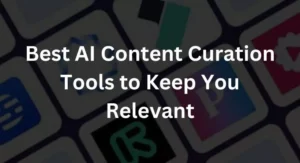
In the fast-evolving digital market space, customers are now seeking authenticity and human connection from brands more than ever. To meet this growing demand, marketing teams need to operate with agility, think creatively, meet tight deadlines, all while working with limited budgets and constrained team resources. Fortunately, innovative technologies like artificial intelligence (AI) offer sustainable solutions to tackle these challenges. They are reshaping the marketing landscape, with an increasing number of marketers testifying that AI capabilities have significantly boosted their creativity and workflow efficiency. More and more teams are turning to AI marketing to focus on creating compelling content while efficiently handling laborious tasks such as data analysis, reporting, and message management.
In this article, we will delve into the top AI use cases in marketing that are taking center stage as we prepare for 2024. Read on for actionable insights that will help you achieve your revenue goals and marketing objectives head-on.
The Positive Impact of AI on Marketing Disciplines

According to the 2023 Sprout Social Index™, a staggering 81% of the 900 surveyed marketers have already experienced the positive impact of AI in their work. Seventy-eight percent have witnessed AI’s benefits in creative areas like content ideation, and another 73% have reported a positive impact on productivity.
AI is also empowering social teams to understand and engage with their audiences more effectively. It provides valuable brand insights derived from social listening, which, in turn, inspire engaging content, personalize customer care, and delve deeper into performance metrics.
Furthermore, AI-driven marketing automation is a game-changer, assisting marketers in enhancing speed and efficiency. It enables them to delegate time-consuming tasks such as managing digital ads, email campaigns, and social post scheduling, granting them more time to focus on strategy development.
Not surprisingly, a Q2 2023 Sprout Pulse Survey of 255 social marketers revealed that 71% have already integrated AI and automation tools into their workflows, with 82% of them reporting positive results.
You may also like reading: AI for Customer Support and Why You Need It
The Top 7 AI + Social Marketing Use Cases for 2024
Given the promising results, more companies are planning to harness the power of AI in 2024 to strengthen their marketing teams and fortify their overall business strategy. Here are the most prominent AI use cases in marketing for social media managers as they gear up for the coming year.
1. Analyzing Social Media Data
Social media data is a goldmine of brand and customer insights that AI tools can effortlessly mine to surface critical information. For instance, the State of Social Media Report found that 95% of leaders use social data to inform business decisions, such as lead generation, product development, and competitor analysis. Social media data analysis is not only empowering marketing teams but also cross-functional teams.
Competitor monitoring is another vital AI use case in marketing, with 92% of business leaders in 2024 relying on it to improve brand positioning. AI tools extract competitor insights using advanced semantic search and other AI algorithms from social listening data. For example, Sprout employs named entity recognition (NER) to identify and analyze competing brands and their content, providing actionable insights to enhance your brand’s performance.
This capability delves into competitor content engagements, post frequency, hashtag usage, and other key performance metrics using keywords and @mentions that you determine. This allows you to cut through the noise of thousands of social conversations in seconds to acquire data that truly matters to your brand.
Influencer marketing is yet another key area where AI shines. AI models monitor posts, interactions, and audience demographics of potential influencers so marketers can assess their suitability for brand partnerships. Sprout’s recent acquisition of Tagger exemplifies how social data analysis and AI capabilities are converging to manage intelligence, reporting, and workflows for influencer marketing.
2. Content Creation
The 2023 Index found that content creation remains one of the most time-consuming tasks for marketers. It’s not just about the creative ideation; it’s also about the pressure to ensure that the content is timely, relevant, engaging, and distinct enough to captivate audiences and prevent them from scrolling past.
Social media managers and teams can now rely on dedicated AI-enabled social management tools for content creation and ideation, eliminating the pitfalls of generic AI tools. For instance, Sprout’s “Suggestions by AI Assist” feature streamlines content creation by offering three tailored copy options in seconds. Sprout understands the nuances of social conversations through natural language processing (NLP) and provides relevant content recommendations based on data, resulting in compelling content that drives leads and conversions.
This way, marketing teams can amplify the impact of their social strategy and free up time to focus on developing winning campaigns.
3. Social Media Advertising and Campaign Targeting
Social media advertising and campaign reporting represent key AI use cases in marketing. Marketers are using AI to optimize social media advertising, making ads more appealing by analyzing audience engagement and preferences. For example, campaigns like Coca-Cola combine storytelling techniques with generative AI to create intriguing ad videos.
Machine learning (ML) algorithms automatically conduct A/B tests on different ad variations, continuously optimizing ad campaigns by learning which elements perform best for different campaigns segments. This leads to more targeted, personalized ads. AI-powered insights, along with predictive analytics, automatically suggest relevant products and services based on past user interactions, boosting campaign targeting and performance.
These advantages enable marketers to maximize the potential of paid advertising and enhance targeting results in a fraction of the time it would take to manually analyze and customize them.
AI tools can also create dynamic ads that automatically update product information and prices based on user behavior, maximizing ROI while saving your marketing team from the cumbersome task of monitoring and adjusting ad copy manually.
4. Social Media Scheduling and Posting
Social media teams often juggle multiple priorities, from responding to timely customer issues to ensuring they meet content and post deadlines. This is where AI marketing tools come in, automating these functions with precision, saving teams time and effort. For example, Sprout’s AI capabilities automate social media scheduling and posting by determining the best times to post for maximum audience engagement and impressions. Machine learning algorithms analyze engagement metrics over time to provide scheduling options, including optimal send times and hashtag recommendations to ensure optimal post engagement.
This allows marketers to efficiently plan, organize, and schedule social posts across various networks, including Facebook, Instagram, and LinkedIn, with data-driven accuracy.
5. Building Chatbots
Chatbots represent a compelling AI use case in marketing, with 54% of marketers planning to use them at scale in 2024 for social customer care, along with other resources like FAQs and customer forums, as indicated by the 2023 Index. Chatbots enable brands to deliver real-time, personalized interactions with customers, offering round-the-clock responses to inquiries. This significantly enhances customer satisfaction and builds strong brand relationships, especially since 16% of customers expect immediate responses and 23% expect replies within two hours.
AI-enabled chatbots, powered by ML and neural networks, become smarter as they process more information and gather valuable data on user behavior. However, these virtual agents need training, adaptation to your tech stack, and ongoing monitoring. Brands like Sephora are already utilizing AI chatbots to connect with customers and facilitate live influencer interactions to drive engagement.
On the other hand, rules-based chatbots are simpler to set up and enable brands to offer 24/7 availability to their customers. Whether you use an AI-enabled chatbot or a rules-based one like Sprout’s, you can significantly enhance efficiency by addressing product queries, providing recommendations, and guiding users through the sales funnel, even when your marketing team is unavailable.
6. Social Media Measurement
Social performance analytics have become a crucial part of a brand’s overall strategy. A substantial 60% of marketers plan to measure and quantify the value of social engagements in terms of revenue impact to meet their 2024 business goals. Given the increased involvement of leadership teams in a brand’s social engine, 32% of marketers now share social metrics with their executive leadership on a weekly basis.
ML models like Sprout’s automatically and accurately measure quantitative and qualitative social metrics within minutes, saving you hours of manual engagement and performance analysis. This is a significant advantage for marketers looking to enhance their social media ROI while navigating the ever-changing social media landscape.
7. Sentiment Analysis
Marketers are increasingly turning to sentiment analysis to assess the tone and sentiment expressed in comments, posts, and conversations surrounding their brand. This is a crucial AI capability, considering that 44% of marketers, as per The State of Social Media Report, use sentiment mining to understand customer feedback and improve their response to issues.
Analyzing sentiment in social conversations also helps brands identify early signs of negative sentiment and take proactive measures before situations escalate. For instance, in Sprout, you can detect unusual spikes in brand mentions and monitor whether they are negative or positive. This allows you to actively manage your reputation to ensure brand health. Sentiment analysis algorithms also tag incoming messages as positive or negative, enabling your social customer care teams to prioritize them based on their criticality.
How to Adopt AI Mindfully

Creating connections and building community requires a considerable amount of time and effort, both of which are often limited for social marketing teams. AI offers a solution by automating functions, streamlining workflows, and increasing team transparency. However, there are concerns from both social marketers and customers. While social teams worry about job displacement, 42% of consumers, according to the 2023 Social Index, are apprehensive about brands using AI in social media interactions, fearing reduced human interaction.
Leadership teams can address these concerns by implementing AI use cases in marketing thoughtfully. This involves collaborating closely with the IT and legal teams to choose the right AI tools for various departments. It also means developing an effective AI use policy for employees to provide a concrete framework for benefiting from AI software.
This is crucial because intentionally incorporating AI tools into your tech stack can offload manual and cumbersome tasks, such as posting, scheduling, and performance analytics, allowing marketing teams to focus on tasks that truly depend on their expertise. This includes audience research, creating compelling content, driving audience engagement, and, most importantly, providing personalized customer care.
Conclusion
In conclusion, AI is not just a buzzword in marketing; it’s a powerful tool that can transform your strategies in 2024. By embracing AI use cases intelligently, you can stay ahead of the curve, elevate your marketing game, and create lasting connections with your audience.
FAQs
1. What are some key AI use cases in marketing for 2024?
Some key AI use cases in marketing for 2024 include analyzing social media data, content creation, social media advertising and campaign targeting, social media scheduling and posting, building chatbots, social media measurement, and sentiment analysis.
2. How can AI benefit social media marketing teams?
AI can benefit social media marketing teams by automating tasks, such as content creation and scheduling, analyzing data for valuable insights, and enhancing customer interactions through chatbots.
3. What are the concerns related to the use of AI in social media marketing?
Some concerns related to the use of AI in social media marketing include fears of reduced human interaction, potential job displacement in marketing teams, and the need for thoughtful implementation to address these concerns.
4. How can AI help in optimizing social media advertising campaigns?
AI can optimize social media advertising campaigns by analyzing audience engagement and preferences, conducting A/B tests on ad variations, and suggesting relevant products and services based on user interactions, leading to more targeted and personalized ads.
5. What is the significance of sentiment analysis in social media marketing?
Sentiment analysis in social media marketing helps brands assess the tone and sentiment expressed in comments, posts, and conversations, allowing them to understand customer feedback, identify early signs of negative sentiment, and actively manage their reputation.





